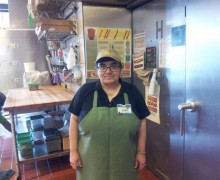Employment Success Stories
Lori S.
After almost 15 years in a sheltered workshop, Lori S. is working in the community, in a professional environment working alongside people without a disability. She is actively building up a resume and a pathway to a career.
“She is amazing, a delight to be around and hilarious,” said Cheryl Raposa, a social worker and Lori’s case manager.
With her humor and warmth Lori - who has mild to moderate intellectual disabilities - was a star in the vocational culinary training program she completed last year that put her on the path to full-time employment. She is open and engaging, and very much willing to pursue whatever additional training could lead to full-time employment.
“Lori set a great tone and example for participants in the program who were more reluctant;” Cheryl said. “She really loved being there.” Wil Edwards, the program’s culinary instructor and Lori’s job coach, said that about 30 people from the sheltered workshop asked to join the culinary program, an extraordinarily high number. Wil divided the group into teams. Lori, who was among the first to volunteer, was part of the team selected for the earliest training and placement.
When the training began there was nervousness on the part of the trainees, a fear of the unknown among people who had spent so many years in a sheltered environment. The training included exercises to build self-esteem and communications skills. Wil created an in-house production line to simulate a real-world restaurant environment. Participants learned a range of skills – prep, chopping, busing, sandwich making, deli work, and managing salad bars and soup stations – and also how to greet and engage customers. They also learned how to operate a cash register, serve customers and generally be proficient in a restaurant environment.
Lori said that she jumped at the opportunity because she really wants to learn, and to improve her chances for an exciting career. . Her favorite parts of the training involved learning about tools and processes for food preparation, like chopping skills. The most challenging aspects of the training had to do with measurement, such as making sure that all of the ingredients in preparing salad dressings are in the right proportions.
“You have to make sure it is the right size and the right measure,” Lori said.
Despite the challenges Lori mastered the skills. She quickly established herself as a leader and took on some supervisory responsibilities in the kitchen. “I could see her capabilities right away, and they were very good,” said Wil. “She was a huge help in running the program.”
While attending a job fair with a group of culinary students Wil learned about job openings at a Panera restaurant in Seekonk, MA. After initial interviews at the job fair some of the students, including Lori, were invited back for a second interview at the restaurant.
Panera is a socially conscious company that hires people with barriers from the communities where their restaurants are located. They also see the benefit in hiring reliable, well trained workers.
Professional interviews with strangers can be stressful for people who have spent extended periods of time in sheltered workshops. Lori was definitely nervous prior to the interview even though she knew that she was fully up to the job. The nerves stemmed from the fact that she wanted so badly to be hired, and didn’t want to appear to be pushing too hard. She also didn’t want to set herself up for disappointment in case she didn’t get it.
Despite her worries Lori really shined at the interview. She was enthusiastic, talking about how much she loved the food at Panera and how excited she was about the possibility of working there.
The next 10 days brought more stress as Lori waited for word from Panera. When the call finally came informing her that she had been hired, Lori was ecstatic. After hanging up she dashed off to tell all of her colleagues and friends at the sheltered workshop.
Lori continued to shine throughout the orientation session at Panera, where she built rapport with supervisors and other new hires. Lori was given three shifts, Friday through Sunday from 12-4 pm. Her responsibilities include following a circuit through the restaurant, cleaning, making coffee, replenishing condiment and silverware stations and other tasks. There have been some anxious moments, but when they arose Lori engages supervisors, learns and moved on.
One of the biggest challenges for Lori is constantly being on her feet, which wasn’t the case when she did piecework at the sheltered workshop. Panera is very busy, so she’s always in motion. She is taking advantages of some of the employee fitness programs, including a weight loss class that provides rewards for meeting certain targets. She is exercising more and may take advantage of a bowling tournament and other group sports activities.
“Everything is good,” Lori said. “I just want to keep bettering myself.”

